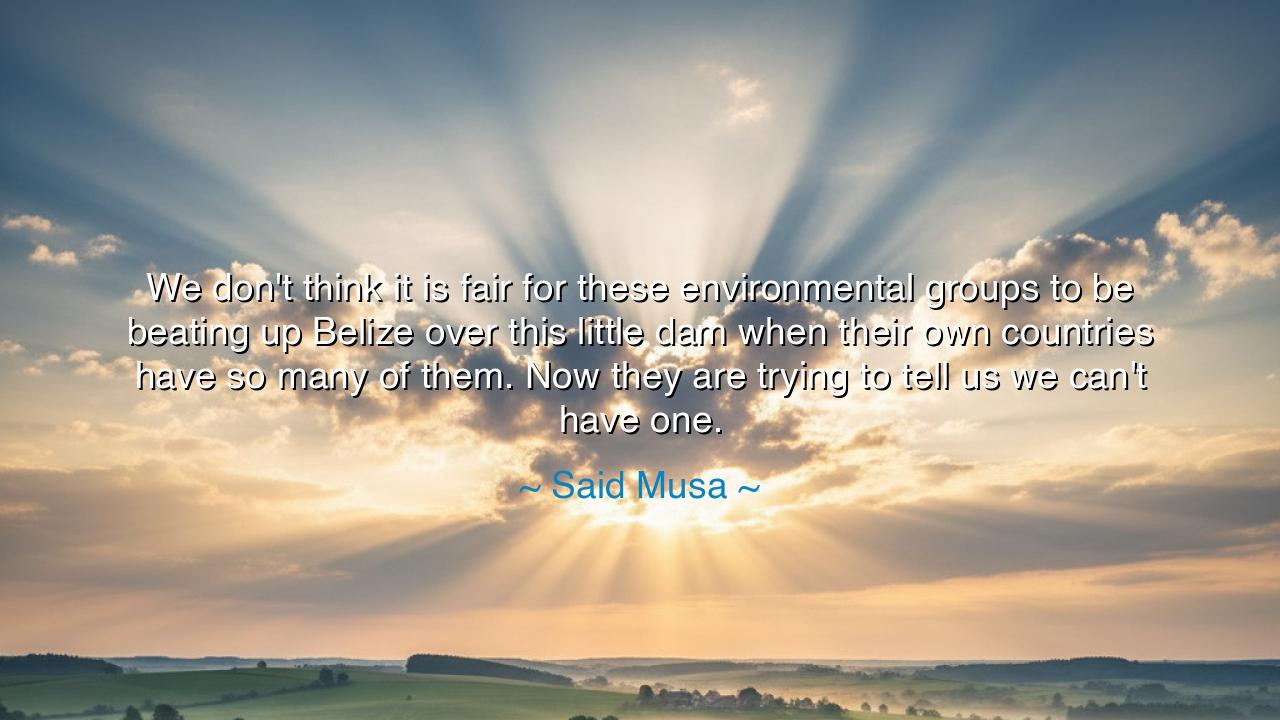
We don't think it is fair for these environmental groups to be
We don't think it is fair for these environmental groups to be beating up Belize over this little dam when their own countries have so many of them. Now they are trying to tell us we can't have one.






When Said Musa, the former Prime Minister of Belize, declared, “We don’t think it is fair for these environmental groups to be beating up Belize over this little dam when their own countries have so many of them. Now they are trying to tell us we can’t have one,” he spoke with the voice of a small nation standing before the judgment of greater powers. His words carry the tone of both frustration and dignity — a defense not merely of a project, but of sovereignty, fairness, and the right of a people to shape their own destiny. Beneath his statement lies an ancient and eternal struggle: the tension between the powerful and the small, between those who command global influence and those who must live with the weight of their consequences.
The origin of this quote lies in the early 2000s, when Belize faced international criticism over the construction of the Chalillo Dam — a hydroelectric project built to supply power to its citizens. Environmental organizations, many of them foreign, condemned the dam for its impact on wildlife and ecosystems. But for Musa and the people of Belize, it was a question of progress — of balancing preservation with survival. His words reveal the anguish of a leader caught between development and dependency, between the voice of his people and the disapproval of outsiders who, as he reminds them, have already reshaped their own landscapes with countless dams and industries.
In this conflict, Musa’s words echo the voice of the colonized and the overlooked throughout history — nations asked to bear burdens that others refuse to share. The tone of moral hypocrisy he condemns is not new. When empires once lectured the world about civilization while extracting its resources, they planted the same seed of resentment. Now, in a new age, environmental power has replaced colonial power — yet the dynamic remains: the North admonishes the South, forgetting its own scars of excess. Musa’s words are therefore not rebellion but balance; not defiance, but a plea for equality in the moral dialogue of humanity.
Consider the story of India’s Narmada Valley, where the struggle over dam building became a symbol of the same tension. Foreign critics decried India’s projects as destructive, yet their own nations had long reaped the fruits of industrial power. Activists and leaders stood divided — some calling for restraint, others for progress — yet both sides spoke from pain and necessity. Like Musa’s Belize, they faced the impossible question: how does a developing nation honor the Earth and still feed its children? The ancients, had they lived to see it, would have understood this paradox well, for every civilization has faced the same dilemma — how to live in harmony with nature while striving for survival.
Musa’s defense of his country’s choice carries a philosophical weight beyond its political moment. He reminds us that fairness cannot exist without empathy — that one must see the struggle of others not from towers of privilege, but from the soil where they labor. His words challenge the arrogance of selective virtue, the ease with which comfort judges necessity. He speaks for all small nations who wish to stand on their own feet, not forever as the pupils of global conscience, but as partners in it. His statement, though rooted in one dam, becomes a declaration of dignity for every country denied the right to grow.
Yet, his words also summon a deeper reflection: progress must not become justification for blindness. Though Musa’s plea is righteous, it also carries a warning for all who lead — that the power to build must always walk beside wisdom. To claim equality is not to reject responsibility. True sovereignty is not freedom from criticism, but the maturity to hold both justice and compassion in the same hand. Even as he challenges the hypocrisy of the powerful, the wise reader hears in Musa’s tone the unspoken truth that both sides — rich and poor, developed and developing — must find a shared morality toward the Earth.
The lesson of Musa’s quote is therefore twofold: to the powerful, it commands humility — judge no nation without first remembering your own excess; to the small, it urges courage — claim your right to progress, but do so with vision and respect for the world that sustains you. The Earth cannot heal through blame alone, nor thrive through pride alone. It demands cooperation, not condemnation.
So let us carry Musa’s wisdom forward: let no one be scolded for desiring light, but let none build light that casts shadows too deep to bear. Every nation must find its balance — to grow without destroying, to preserve without stagnating. For justice, like the river restrained by the dam, must flow not only for the strong but for all. And only when fairness is shared among nations will humanity finally live as one people — equal before the Earth, united in her care.






AAdministratorAdministrator
Welcome, honored guests. Please leave a comment, we will respond soon